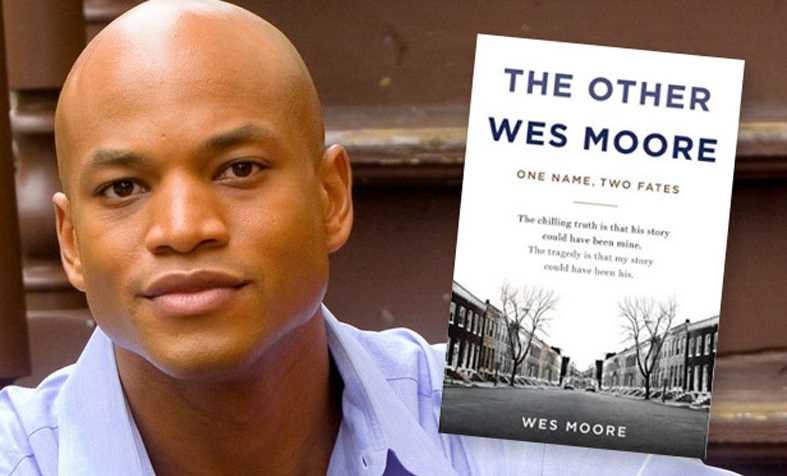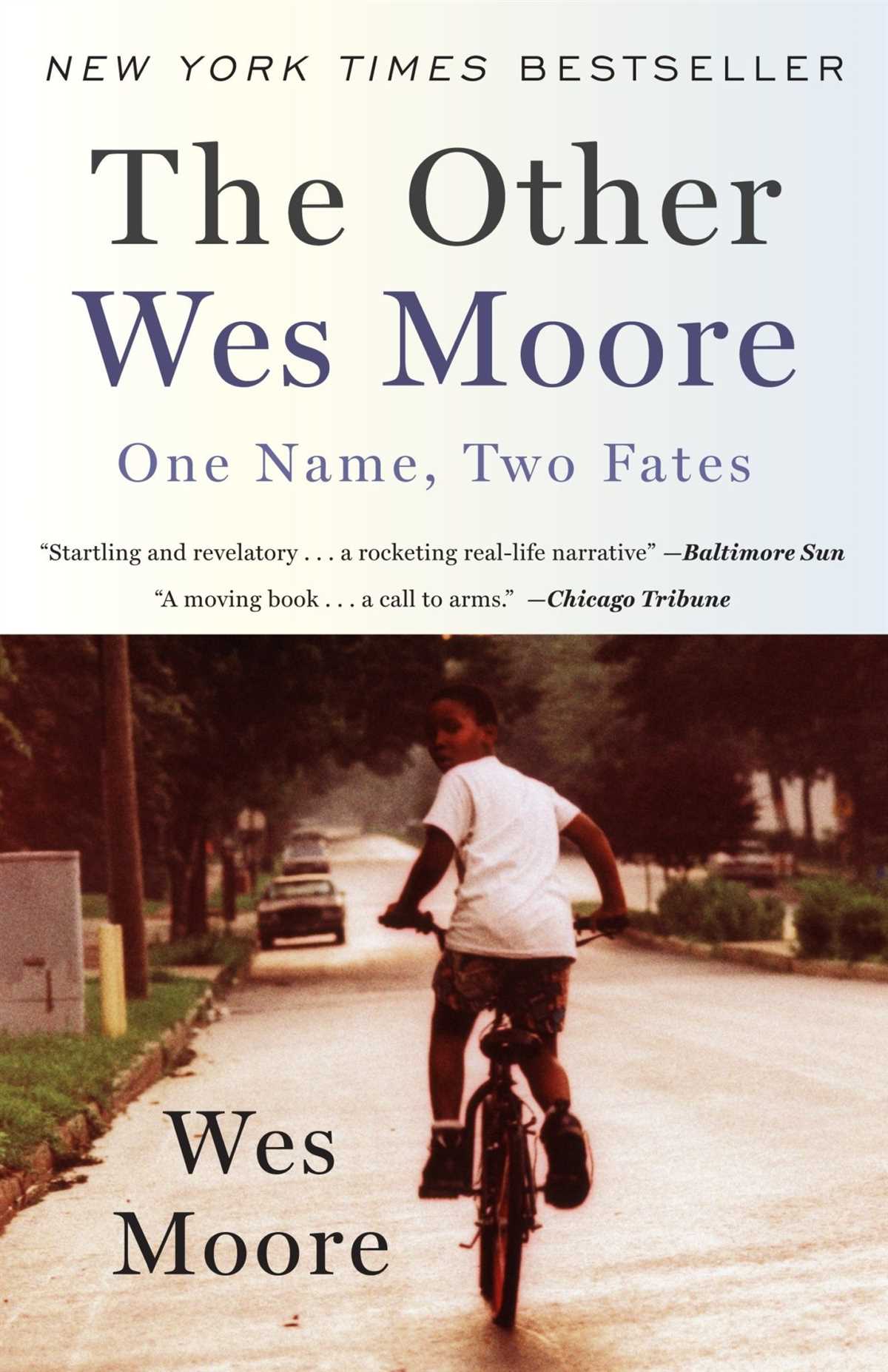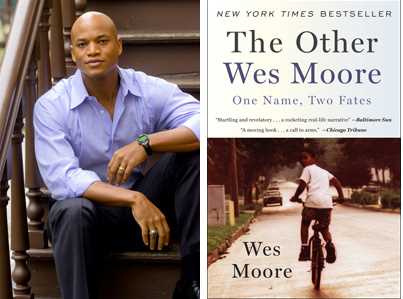
In Chapter 2 of “The Other Wes Moore,” the author continues to explore the parallel lives of the two Wes Moores. This chapter delves into the childhood and early teenage years of both boys, shedding light on the different paths they took. The chapter also raises thought-provoking questions about the influence of family, education, and environment on our destinies.
One of the central questions raised in this chapter is the role of family in shaping our lives. The author, Wes Moore, reflects on his own family dynamics, particularly the influence of his mother and grandparents. He describes his mother as a strong and determined woman who instilled in him a sense of responsibility and ambition. In contrast, the other Wes Moore’s family life is marked by instability and negative influences, such as a absent fathers and older brothers involved in drug dealing.
In addition to family, education is another theme explored in Chapter 2. The author emphasizes the importance of education in his own life and how it opened doors and provided him with opportunities. He attended a prestigious private school and was surrounded by teachers and mentors who believed in his potential. On the other hand, the other Wes Moore’s educational experiences were characterized by underfunding, overcrowding, and a lack of support from teachers and administrators.
The chapter also raises questions about the impact of environment on our choices and opportunities. The author grew up in a supportive and affluent community in Baltimore, while the other Wes Moore was raised in a poverty-stricken neighborhood plagued by crime and drug addiction. These contrasting environments undoubtedly played a role in shaping the boys’ outlooks on life and the opportunities available to them.
Overall, Chapter 2 of “The Other Wes Moore” serves as a platform for reflection on the themes of family, education, and environment in shaping our destinies. It challenges readers to consider the ways in which these factors can influence our choices and opportunities, and raises important questions about the role of personal agency in overcoming adversity.
The Other Wes Moore Chapter 2 Questions and Answers

In Chapter 2 of “The Other Wes Moore,” the author Wes Moore describes his elementary school experience in the Bronx and contrasts it with the experiences of the other Wes Moore, who lived a few blocks away but attended a different school. The chapter raises several questions about the roles of education and opportunity in shaping a person’s life.
One of the key questions raised in this chapter is the impact of school environment on a student’s academic performance. The author’s school, Riverdale Country School, provided a nurturing and challenging environment that encouraged him to excel academically. In contrast, the other Wes Moore’s school, P.S. 119, was plagued by violence and lacked the same level of academic rigor. This raises the question of whether access to quality education is a determining factor in a person’s future success.
- How did the author’s school environment contribute to his academic success?
- How did the other Wes Moore’s school environment hinder his academic progress?
Another question raised in this chapter is the role of parental involvement in a child’s education. The author’s mother played an active role in his education, advocating for him to attend a private school and ensuring that he had access to educational resources outside of school. On the other hand, the other Wes Moore’s mother struggled with addiction and was not able to provide the same level of support and guidance. This raises questions about the impact of parental involvement on a child’s academic success.
- How did the author’s mother’s involvement in his education shape his academic trajectory?
- What challenges did the other Wes Moore face as a result of his mother’s addiction?
These questions and others raised in Chapter 2 highlight the complex interplay between education, environment, and personal circumstances in shaping a person’s life trajectory. The contrasting experiences of the author and the other Wes Moore demonstrate the power of opportunity and support in determining a person’s future outcomes.
Summary of Chapter 2
In Chapter 2 of “The Other Wes Moore,” the author continues to explore the contrasting paths taken by himself and the other Wes Moore. The chapter begins with the author reflecting on his childhood and the strong influence his mother had on him. He describes her as a strong-willed, hardworking woman who instilled in him the values of education and ambition.
The author then introduces the other Wes Moore, detailing his troubled upbringing in Baltimore. Wes grew up in a crime-ridden neighborhood, surrounded by drugs and violence. His father was absent from his life, and his mother struggled with addiction. Despite these challenges, the author notes that Wes was not initially headed down a destructive path.
The chapter explores the pivotal moment in both Wes Moore’s lives when they are sent to military school. The author’s mother decides to enroll him in Valley Forge Military Academy, seeing it as a way to provide him with structure and discipline. Meanwhile, the other Wes Moore’s mother sends him to military school as a consequence for his involvement in a burglary.
The author excels at Valley Forge, thriving in the structured environment. He becomes a leader and gains a sense of purpose and direction. In contrast, the other Wes Moore struggles at military school. He resents the strict rules and rebels against authority. He eventually drops out and returns to Baltimore.
These diverging paths highlight the impact of environment and opportunity on the lives of the two Wes Moores. While the author had a stable and supportive upbringing, the other Wes was surrounded by adversity and lacked positive role models. This chapter sets the stage for the rest of the book, as it explores the factors that shaped the lives and choices of both individuals.
Who is Mary and how does she impact Wes Moore’s life?
Mary is Wes Moore’s mother, and she plays a significant role in shaping his life. As a single mother, Mary is determined to provide a better future for her son, despite the challenges they faced living in the Bronx. She instills in Wes a strong work ethic and emphasizes the importance of education. Mary deeply believes in her son’s potential and encourages him to excel academically and make the most of his opportunities.
Mary’s impact on Wes’s life can be seen in his determination to succeed. She makes sacrifices to ensure that he attends a private school, Riverdale Country School, which provides him with a quality education and access to valuable resources. Mary’s high expectations and belief in Wes’s abilities motivate him to strive for greatness and not settle for mediocrity.
Furthermore, Mary’s influence extends beyond education. She also teaches Wes important values such as integrity, compassion, and resilience. This guidance helps shape Wes’s character and enables him to navigate the challenges he faces in his life, including the temptations and dangers of the streets. Mary’s unwavering support and love provide the foundation for Wes as he grows into a successful adult, ultimately breaking the cycle of poverty.
In Chapter 2 of “The Other Wes Moore,” Wes reflects on the impact his mother had on his life, stating, “I wouldn’t have become me without her. She was an extraordinary woman who did incredible things in her life, and she never let anything get in the way of her dreams.” Mary’s influence not only shapes Wes’s personal development but also plays a crucial role in inspiring him to make positive choices and pursue a path of success.
What is the role of education in Wes Moore’s life?

In Wes Moore’s life, education plays a crucial role in shaping his future and helping him rise above challenging circumstances. Despite growing up in a disadvantaged neighborhood with limited opportunities, Wes realizes that education can be his ticket out of poverty and crime. He recognizes that acquiring knowledge and developing academic skills can open doors and provide him with the tools to create a better life for himself.
Education becomes a lifeline for Wes, separating him from the path of his namesake. While the other Wes Moore succumbs to the temptations of the streets and ends up in jail, Wes Moore prioritizes his education and invests significant effort in excelling academically. He attends a prestigious private school on scholarship and later goes on to graduate from Johns Hopkins University and earn a Rhodes Scholarship. These achievements demonstrate the transformative power of education in his life.
- Education serves as an escape for Wes, allowing him to break free from the cycle of poverty and crime that plagues his community.
- Through education, Wes gains the knowledge and skills necessary to navigate the world and seize opportunities.
- Education provides Wes with a sense of purpose and direction, helping him realize his full potential.
- Wes’s educational journey fosters personal growth and allows him to develop the confidence and resilience needed to face challenges.
- Ultimately, education becomes a catalyst for social mobility, enabling Wes to transcend his disadvantaged background and make a positive impact on his community.
Wes Moore’s story highlights the transformative power of education and serves as a reminder of the invaluable role it can play in shaping a person’s future. It emphasizes the importance of providing equal educational opportunities to all individuals, regardless of their background or socio-economic status, in order to break the cycle of poverty and empower them to achieve their dreams.
How do the experiences of the two Wes Moores differ in terms of their involvement with drugs?

When it comes to their involvement with drugs, the two Wes Moores have vastly different experiences. The author, Wes Moore, grew up in a stable and supportive family environment which shielded him from the temptations of drugs. He was raised by his mother and grandparents, who provided him with a strong foundation and instilled in him the importance of making good choices. As a result, Wes Moore did not get involved in drugs and was able to focus on his education and personal development.
On the other hand, the other Wes Moore had a much different experience. He grew up in a challenging environment characterized by poverty, violence, and drug addiction. His father was absent from his life, and his mother struggled with drug addiction, which left him without proper guidance and supervision. As a result, the other Wes Moore became involved in drugs at a young age, starting with marijuana and then progressing to dealing drugs as a way to make money.
- One key difference in their experiences with drugs is their access to opportunities. Wes Moore, the author, was fortunate enough to attend a prestigious boarding school and later serve in the military, which provided him with structure, discipline, and opportunities for personal growth. The other Wes Moore, on the other hand, was not able to access such opportunities and was stuck in a cycle of poverty and drug addiction.
- Another difference lies in their support systems. Wes Moore had a strong support system consisting of his family and mentors who guided him and helped him make positive choices. In contrast, the other Wes Moore lacked such support, which made it easier for him to succumb to the pressures of drugs and the negative influences in his environment.
Overall, the two Wes Moores’ experiences with drugs highlight the impact of family, environment, and access to opportunities on an individual’s choices and outcomes. The author’s experience demonstrates the power of a supportive environment and the ability to rise above challenges, while the other Wes Moore’s experience sheds light on the cycle of poverty and addiction that can trap individuals in a destructive path. These contrasting experiences emphasize the importance of addressing systemic issues such as poverty, education, and access to resources in order to break these cycles and provide opportunities for all individuals to thrive.
How does the support system of each Wes Moore contribute to their different paths?
The support system plays a crucial role in shaping the lives and outcomes of individuals, and this holds true for both Wes Moores. In the case of the author Wes Moore, he had a strong support system consisting of his parents, who provided him with love, affection, and guidance throughout his upbringing. His parents were supportive, encouraging him to pursue education and providing him with opportunities to excel. This support system gave the author the foundation and motivation to strive for success, resulting in him attending prestigious schools and eventually becoming a Rhodes Scholar.
On the other hand, the other Wes Moore had a different support system, or rather lack thereof. Growing up in a disadvantaged neighborhood, Wes lacked the necessary support and guidance from his parents. His father was absent, and his mother struggled with drug addiction, leaving him without stable parental figures in his life. This lack of support not only affected Wes’s emotional well-being but also limited his opportunities for a better future. Without proper guidance, Wes deviated towards a life of crime and violence, leading to his eventual incarceration.
The difference in support systems between the two Wes Moores directly contributed to their contrasting paths. The author had a strong foundation of support that nurtured his aspirations and provided him with the tools to succeed. In contrast, the other Wes Moore faced numerous challenges due to the absence of a supportive environment, leading him down a path marked by poverty and crime.
The importance of a support system cannot be underestimated, as it can shape an individual’s mindset, opportunities, and overall trajectory in life. The author’s support system provided him with a sense of belonging, purpose, and belief in his abilities. In contrast, the other Wes Moore’s lack of a supportive network left him vulnerable to negative influences and limited his prospects for personal growth and success. This comparison highlights how crucial a strong support system is in shaping one’s life outcomes, highlighting the need for communities and institutions to provide resources and support to those who may be lacking it.
Major Themes Explored in Chapter 2 and their Relation to the Overall Narrative

In Chapter 2 of “The Other Wes Moore,” several major themes are explored, shedding light on the characters and their experiences. These themes help to shape the overall narrative and provide deeper insights into the lives of the two Wes Moores.
1. Fatherhood and Absence: One of the prominent themes in this chapter is the role of fathers and their absence in the lives of the two Wes Moores. While the author’s father, Wes Moore Sr., is actively present and influential in his life, the other Wes Moore grows up without a consistent father figure.
2. Influence of Peers: Another theme that emerges is the influence of peers on the two Wes Moores. The author is influenced by positive peer relationships, such as his high-achieving friends, which motivate him to strive for success. In contrast, the other Wes Moore is influenced by negative peer relationships, leading him down a path of trouble and crime.
3. Expectations and Opportunities: The theme of expectations and opportunities is also explored in this chapter. The author’s mother and teachers have high expectations for him and provide him with numerous opportunities to succeed. Conversely, the other Wes Moore faces low expectations and limited opportunities, which contributes to his struggles.
4. Education as a Pathway: The importance of education as a pathway to success is a significant theme in Chapter 2. The author’s mother prioritizes his education and encourages him to take advantage of the opportunities available to him. Meanwhile, the other Wes Moore’s education is hindered by various factors, including a lack of support and resources.
5. Personal Responsibility: Personal responsibility is also explored in this chapter. The author takes responsibility for his actions and makes conscious choices to pursue a better life. In contrast, the other Wes Moore initially fails to take responsibility for his actions and blames external factors for his circumstances.
In conclusion, Chapter 2 of “The Other Wes Moore” delves into several major themes, including fatherhood, peer influence, expectations, education, and personal responsibility. These themes play a crucial role in shaping the narrative by highlighting the contrasting paths and experiences of the two Wes Moores. The chapter sets the foundation for the overarching themes of choices, identity, and the impact of external factors that shape the lives of individuals.